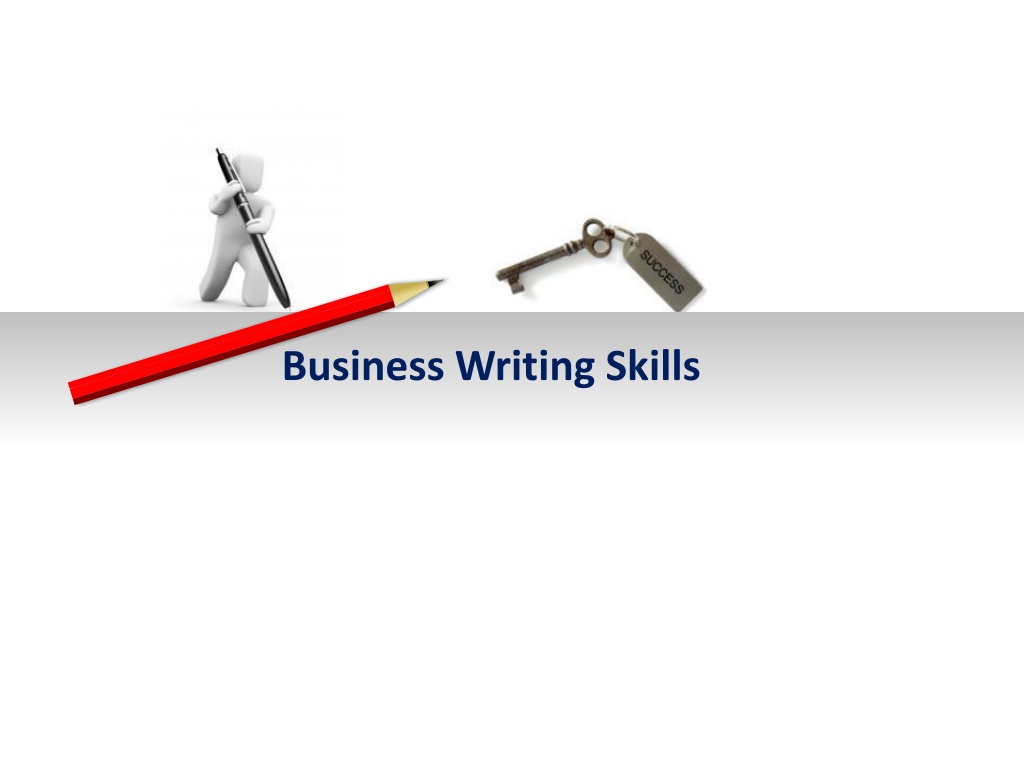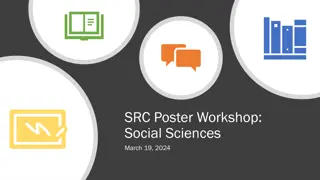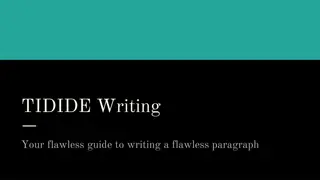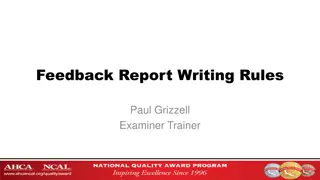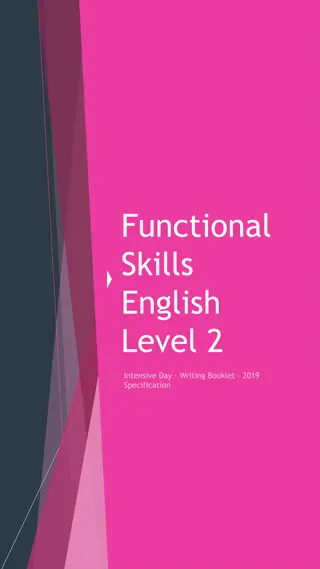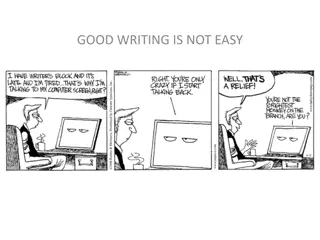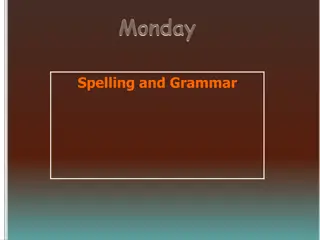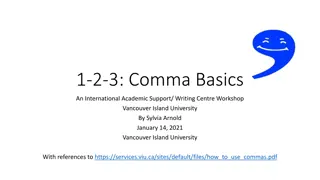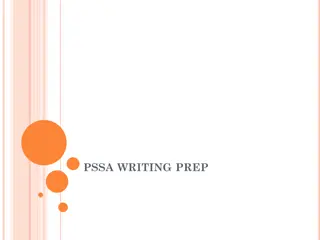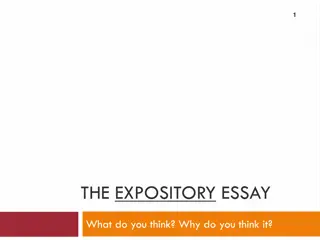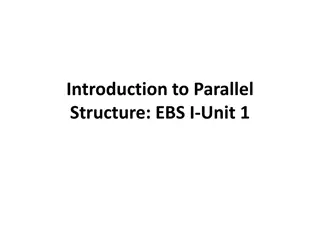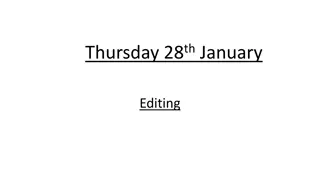Mastering Business Writing Skills: A Comprehensive Guide
Understanding the essence of business communication, types of communication, essentials of effective communication, smart communication tips, and communication across cultures is vital for professional success. Explore verbal, written, and non-verbal communication methods to enhance your communication skills in the business world.
Download Presentation

Please find below an Image/Link to download the presentation.
The content on the website is provided AS IS for your information and personal use only. It may not be sold, licensed, or shared on other websites without obtaining consent from the author. Download presentation by click this link. If you encounter any issues during the download, it is possible that the publisher has removed the file from their server.
E N D
Presentation Transcript
SPIN INTERVIEW FRAMEWORK Learning Objectives 1 What is Business Communication 2 Types of Communication 3 STAR Format of Written Communication # 4 Essentials of Effective Communication 5 Tips for Smart Communication 6 Communication across cultures 7 Exercises 8 Summary
What is Business Communication? Let s first understand what is communication... Communication is transferring information and understanding from one to one or one to many. It could take place in a verbal or a written mode and could use forms such as face-to-face meetings, group discussions, e-mail writing, and even non verbal modes like gestures, body language, etc. # Message Message Message CHANNEL DECODING SENDER RECEIVER FEEDBACK
What is Business Communication? Business Communication is any communication that involves communicating for business / official purpose to achieve a predetermined objective. This may include: CVs, Resumes Email, Web site, FAQs Letters, Newsletters, Brochures, # Articles, Catalogs Advertisements, Notice Board, Pamphlets, Signs, Press Releases Presentations, multimedia, talks Reports, Manuals, Proposals, Books
SPIN INTERVIEW FRAMEWORK Learning Objectives 1 What is Business Communication 2 Types of Communication 3 STAR Format of Written Communication # 4 Essentials of Effective Communication 5 Tips for Smart Communication 6 Communication across cultures 7 Exercises 8 Summary
Types of Communication Types of Communication Verbal Communication Written # Non Verbal Verbal Written Non Verbal
Types of Communication Verbal Communication Communication Provides instant feedback Opportunity to check for understanding Involves Questioning & Paraphrasing Faster closure on open items No record unless minutes of the meeting recorded Usually unstructured Increases speed of communication # Non Verbal Verbal Written
Types of Communication Written Communication Provides record for future reference More structured Tools to gain attention like bullets, bold, etc. Ability to provide details Can be sent to multiple people at the same time More Formal It mainly consists of diagrams, pictures, graphs, reports, policies, rules, orders, instructions, agreements, etc. Comprehensive & Accurate Communication # Non Verbal Verbal Written
Types of Communication Non Verbal Communication Constitutes of Physical, Aesthetic, Signs, Symbolic Complements Verbal Communication - It may accent or underline a verbal message. Pounding the table, for example, can underline a message. Gestures talk more than words Could be Positive / Negative Indicative of a person s personality Communication # Non Verbal Verbal Written
SPIN INTERVIEW FRAMEWORK Learning Objectives 1 What is Business Communication 2 Types of Communication 3 STAR Format of Written Communication # 4 Essentials of Effective Communication 5 Tips for Smart Communication 6 Communication across cultures 7 Exercises 8 Summary
STAR Format of Written Communication 1. Analyze the Purpose 2. Consider the Audience 5. Execute with Confidence STAR / ACBDE Model of Communication 4. Detail & Design Approach 3. Build the Structure
STAR Format of Written Communication 1. Analyze the Purpose Before you begin writing: What is the purpose of writing the mail / letter / memo / etc.? What information do you wish to exchange? What does your reader want to know? What action do you want the reader to take? What relationship do you have with the reader? # If you can t answer these questions, then you should wonder, whether you should even the send the communication.
STAR Format of Written Communication 1. Analyze the Purpose Subject of the Mail Subject should convey the purpose Subject field is the first thing reader will see before opening the communication sent Subject field of your message should be meaningful Subject field [when you use the reply option in case of e-mails] should accurately reflect the content of the message Subject should be brief - Does not need to be a complete sentence #
STAR Format of Written Communication 1. Analyze the Purpose 2. Consider the Audience 5. Execute with Confidence STAR / ACBDE Model of Communication 4. Detail & Design Approach 3. Build the Structure
STAR Format of Written Communication 2. Consider the Audience Recipients & Gender Bias Write the name of the person that you are writing to, in the To field Write the name of the person / persons you want to be informed about the contents of the mail in the Cc field Do not write names in the Bcc field Avoid using he / she repeatedly. Write sentences in the plural For example, A vendor should give all his details for setting up the database. can be changed to Vendors should give all their details for setting up the database. #
STAR Format of Written Communication 1. Analyze the Purpose 2. Consider the Audience 5. Execute with Confidence STAR / ACBDE Model of Communication 4. Detail & Design Approach 3. Build the Structure
STAR Format of Written Communication 3. Build the Structure 1. Salutation 2. Content 3. Closing Structure of Written Communication
STAR Format of Written Communication 3. Build the Structure Salutation Write to the reader as you would talk to him / her naturally - If you address John Smith as John in person, do not address him as Mr. Smith in your email, however, memos / circulars are more formal and hence require Mr. / Miss. Use first names - Hi Chris Avoid Good Morning or Good Afternoon as your communication might reach late / different time zone #
STAR Format of Written Communication 3. Build the Structure Content Don ts Don t tell the reader what you or they can t do... tell them what can be done Negative statements - Don t tell them something negative unless it is important that they have the information For e.g. This report never goes into any phase of the matter in detail, but covers each part briefly. Don t use casual language Business communication is always formal & organized Do s Mention any specific information that is requested by the reader - If you cannot answer a question or provide definite information: state when you can send the information. explain why you won t be able to answer the query. tell as much as you know / offer additional information when available. Use Positive statements For e.g. This report discusses each step briefly. Content should be accurate & crisp
STAR Format of Written Communication 3. Build the Structure Closing The final paragraph of a written business communication states what you want the person to do Give timelines Signoff with your name and contact details in case of any questions / clarifications Do not say thanks in advance/ anticipation. If you would like to thank someone for their help. Do it after the job. Say I appreciate your help . Or Thanks for the quick response Close on a pleasant note #
STAR Format of Written Communication 1. Analyze the Purpose 2. Consider the Audience 5. Execute with Confidence STAR / ACBDE Model of Communication 4. Detail & Design Approach 3. Build the Structure
4. Detail & Design Approach Components of Detail & Design Punctuation Inappropriate use of punctuation could change the meaning of the sentence It makes the communication look more structured & clear Formatting All letters should be Arial - size 10 / 12 Use line spacing set in the template Separate paragraphs with one blank line in between Paragraphing Keep one main idea per paragraph Use short paragraphs Ideas in successive paragraphs can be related
STAR Format of Written Communication 4. Detail & Design Approach More on Punctuation A Period marks the end of a sentence. For e.g. I believe the changes have been made. Have we tested them to see if the data is following the assignment rules? # A period is used in abbreviations of words. Company - Co. or miscellaneous misc.
STAR Format of Written Communication 4. Detail & Design Approach More on Punctuation Use a Comma to separate a phrase which precedes the main sentence. I will come for the party, however, I shall leave early. Use a comma to set off linking words. Request the client for the check number. Then, go to the fleet window and get the copies. Examples of linking words - However, Moreover, Therefore, Nevertheless, Thereby. #
STAR Format of Written Communication 4. Detail & Design Approach More on Punctuation The Colon announces that a list is about to follow; it is the gateway to that list. It means : As follows 1. The requirements for this position are: A degree in Accounts or Economics Sound financial background # The Apostrophe is used to: 1. Show possession Anu s case studies 2. Show contractions [not acceptable in formal writing] It ll [It will]
STAR Format of Written Communication 4. Detail & Design Approach Use limited colors Avoid double emphasis Use templates Use glossy paper Use no more than 5 fonts Rewrite Combine sentences Omit needless words Brief writing style
STAR Format of Written Communication 1. Analyze the Purpose 2. Consider the Audience 5. Execute with Confidence STAR / ACBDE Model of Communication 4. Detail & Design Approach 3. Build the Structure
STAR Format of Written Communication 5. Execute with Confidence Never write when you are upset Write quickly; Write the easy parts First Write like you talk: You ll fix it later # Imagine explaining the subject in person. Do a spell check before sending Read the message a one more time before sending
STAR Format of Written Communication 5. Execute with Confidence The Write Perfect Checklist - Before clicking on send Review! Is the communication well organized in terms of formatting, structuring, etc.? Have I stated my purpose correctly and provided information that the readers would like to know? Have I written in appropriate, short and crisp sentences? Have I stated clearly what response I want from the reader ? Is my communication sounding pleasant?
SPIN INTERVIEW FRAMEWORK Learning Objectives 1 What is Business Communication 2 Types of Communication 3 STAR Format of Written Communication # 4 Essentials of Effective Communication 5 Tips for Smart Communication 6 Communication across cultures 7 Exercises 8 Summary
Essentials of Effective Communication Clear Business communication should be clear and should be self explanatory about why it has been written. Creates Goodwill Complete The information given should be complete and should not leave any scope for questions / lack of information. Saves Reader s Time Correct The information provided should be correct and fact based. Correct Save Reader s Time The communication should be such that the reader saves time in undertsanding the message. Complete Create Goodwill The message should be pleasant. clear, correct as this will result in creating goodwill for te sender of the message / communication. Clear
SPIN INTERVIEW FRAMEWORK Learning Objectives 1 What is Business Communication 2 Types of Communication 3 STAR Format of Written Communication # 4 Essentials of Effective Communication 5 Tips for Smart Communication 6 Communication across cultures 7 Exercises 8 Summary
FIVE FUNCTIONS OF MANAGEMENT Tips for Smart Communication 5 2 1 3 4 Letters & Memos Open & closed punctuation Full stops at end of addresses Full stops in abbreviations Date & Signature Subject Line optional & rare Minutes of the Meeting Decisions reached must be listed Action Items along with stakeholders names must be documented Mailing List Check mailing list for every communication sent Keep updating your mailing list Categorize mailing list as per the information Meeting Agenda Time & place must be mentioned Purpose of meeting must be clearly mentioned. Dial-in numbers must be given in case of virtual conferences Netiquette Never flame. Use FULL CAPS only to emphasize Send messages on a need basis Don t forget to add attachments if mentioned <
FIVE FUNCTIONS OF MANAGEMENT Tips for Smart Communication 10 7 6 8 9 Resume Reports FAQs Covering Letters Brief - 3 paragraphs, bullets Focus on - Major requirements Differentiators - Research through Web / friends / colleagues Do not plead Sales Proposal Content: Budget, Objectives, Strategy & Tactics, Schedule, Results, and Closing Should be persuasive & accurate Content: Name, Objective, Education, Experience, Personal details, References Two pages max Highlight strengths Use templates but enhance them Content: Cover page, Index, Executive summary, Appendices Steps: Define problem, Gather information, Analyze & organize information Should be correct and based on research Should be created by Subject Matter Experts [SMEs] Should have a contact person s e- mail <
Tips for Smart Communication Misplaced Word Beware! Sometimes misplaced words are used for comic effect The other day I shot an elephant in my pajamas. How he got in my pajamas I'll never know. Groucho Marx
Tips for Smart Communication Misplaced Word Beware! Consider the different meanings in the following sentences: The dog under the tree bit Carrie. vs. The dog bit Carrie under the tree.
Tips for Smart Communication Misplaced Word Beware! We have recruited a Marketing Manager who worked for a major competitor named R.C. Verma. We have recruited a Marketing Manager named R.C. Verma who worked for a major competitor.
SPIN INTERVIEW FRAMEWORK Learning Objectives 1 What is Business Communication 2 Types of Communication 3 STAR Format of Written Communication # 4 Essentials of Effective Communication 5 Tips for Smart Communication 6 Communication across cultures 7 Exercises 8 Summary
Communication across Cultures English is frequently the language used in global business even though it is not the language spoken / written by the majority of people in the world. Here s how you can ensure you do not go wrong while communicating across cultures.
Communication across Cultures Tips for Native Speakers of English - Writing Avoid long or complex sentences Do not present someone with too many points at once Avoid Idioms or colloquialisms, slang, jargon Review everything you write to try and determine if a non-native speaker may have difficulty understanding the meaning When in doubt, lean toward the formal side Begin communication with a preliminary statement, such as thanking someone for his or her last communication. This applies to both spoken and written communication Humor is notoriously culture-specific: Many things that pass for humor in one culture can be seen as grossly offensive in another #
SPIN INTERVIEW FRAMEWORK Learning Objectives 1 What is Business Communication 2 Types of Communication 3 STAR Format of Written Communication # 4 Essentials of Effective Communication 5 Tips for Smart Communication 6 Communication across cultures 7 Exercises 8 Summary
Exercises on Written Communication Rewrite in simple words 1. Campus Jewelers main objective is to increase sales. Specifically, the objective is to double sales in the next five years by becoming a more successful business. Campus Jewelers objective is to double sales in the next five years. 2. As of this date I haven't received any documents So far I haven't received any documents. 3. I am in receipt of your letter. I have received your letter.
Exercises on Written Communication Rewrite in simple words 4. In the event that it happens, I will go to Australia. If it happens, I will go to Australia. 5. It often rains in the month of July. It often rains in July. 6. Kindly confirm the same. Please confirm.
Exercises on Written Communication Use a comma to separate a phrase which precedes the main sentence. 1. For any further clarification on vendor discount related issues please call Monica Giroux on Dial Comm. 8*622 2107. For any further clarification on vendor discount related issues, please call Monica Giroux on Dial Comm. 8*622 2107. Which one is correct usage of a comma / period / full stop? I believe the changes went in, have we tested the changes to see if the data is following the assignment rules? I believe the changes have been made. Have we tested them to see if the data is following the assignment rules?
SPIN INTERVIEW FRAMEWORK Learning Objectives 1 What is Business Communication 2 Types of Communication 3 STAR Format of Written Communication # 4 Essentials of Effective Communication 5 Tips for Smart Communication 6 Communication across cultures 7 Exercises 8 Summary
Summary Communication should be Clear, Correct, Crisp, Credible, & Consistent Follow the STAR Format for written communication Any communication should sound pleasant same is true for written communication Be sensitive to other cultures while writing Always review your communication before pressing the send button
